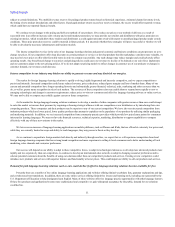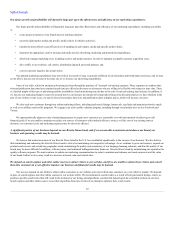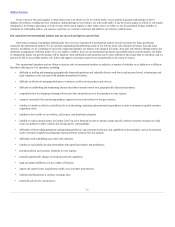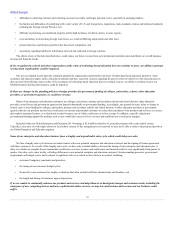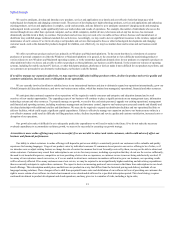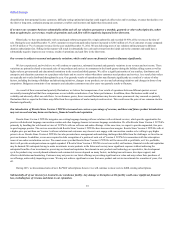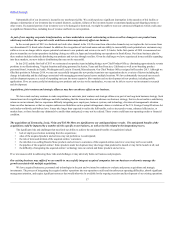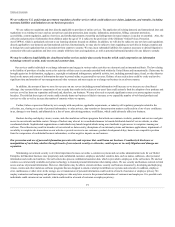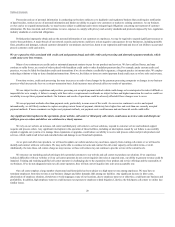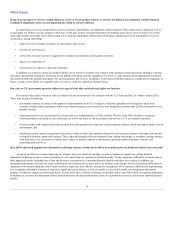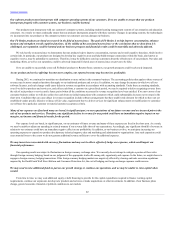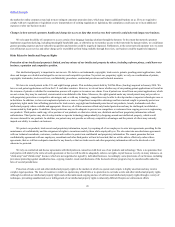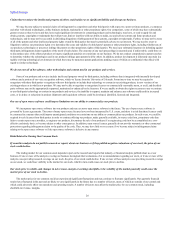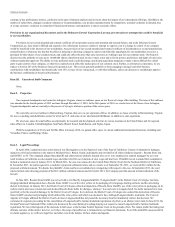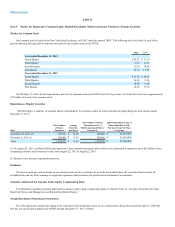Rosetta Stone 2013 Annual Report Download - page 22
Download and view the complete annual report
Please find page 22 of the 2013 Rosetta Stone annual report below. You can navigate through the pages in the report by either clicking on the pages listed below, or by using the keyword search tool below to find specific information within the annual report.
Table of Contents
If any of our products or services contain defects or errors or if new product releases or services are delayed, our reputation could be harmed,
resulting in significant costs to us and impairing our ability to sell our solutions.
If our products or services contain defects, errors or security vulnerabilities, our reputation could be harmed, which could result in significant costs to
us and impair our ability to sell our products in the future. In the past, we have encountered product development delays due to errors or defects. We would
expect that, despite our testing, errors will be found in new products and product enhancements in the future. Significant errors in our products or services
could lead to, among other things:
•delays in or loss of market acceptance of our products and services;
•diversion of our resources;
•a lower rate of license renewals or upgrades for consumer and enterprise and education customers;
•injury to our reputation; or
•increased service expenses or payment of damages.
In addition, we could face claims for product liability, tort or breach of warranty. Our contracts with customers contain provisions relating to warranty
disclaimers and liability limitations, which may not be upheld. Defending a lawsuit, regardless of its merit, is costly and may divert management's attention
and adversely affect the market's perception of us and our products and services. In addition, if our business liability insurance coverage proves inadequate or
future coverage is unavailable on acceptable terms, or at all, we could face significant financial losses.
Our sales to U.S. government agencies subject us to special risks that could adversely affect our business.
Government sales entail a variety of risks as evidenced by the non-renewal of our contracts with the U.S. Army and the U.S. Marine Corps in 2011.
These risks include the following:
•government contracts are subject to the approval of appropriations by the U.S. Congress to fund the expenditures by the agencies under these
contracts. Congress often appropriates funds for government agencies on a yearly basis, even though their contracts may call for performance over a
number of years;
•our products and services are included on a General Services Administration, or GSA, schedule. The loss of the GSA schedule covering our
software products and related services could cause us to lose our ability to sell our products and services to U.S. government customers;
•we must comply with complex federal procurement laws and regulations in connection with government contracts, which may impose added costs on
our business; and
•federal government contracts contain provisions and are subject to laws and regulations that provide government customers with rights and remedies
not typically found in commercial contracts. These rights and remedies allow government clients, among other things, to terminate existing contracts,
with short notice, for convenience, without cause, reduce or modify contracts or subcontracts, and claim rights in products, systems, and
technology produced by us.
If we fail to effectively upgrade our information technology systems, we may not be able to accurately report our financial results or prevent fraud.
As part of our efforts to continue improving our internal control over financial reporting, we plan to continue to upgrade our existing financial
information technology systems in order to automate several controls that are currently performed manually. We may experience difficulties in transitioning to
these upgraded systems, including loss of data and decreases in productivity, as personnel become familiar with these new systems. In addition, our
management information systems will require modification and refinement as we grow and as our business needs change, which could prolong difficulties we
experience with systems transitions, and we may not always employ the most effective systems for our purposes. If we experience difficulties in implementing
new or upgraded information systems or experience significant system failures, or if we are unable to successfully modify our management information
systems or respond to changes in our business needs, we may not be able to effectively manage our business and we may fail to meet our reporting obligations.
In addition, as a result of the automation of these manual processes, the data produced may cause us to question the accuracy of previously reported financial
results.
21


